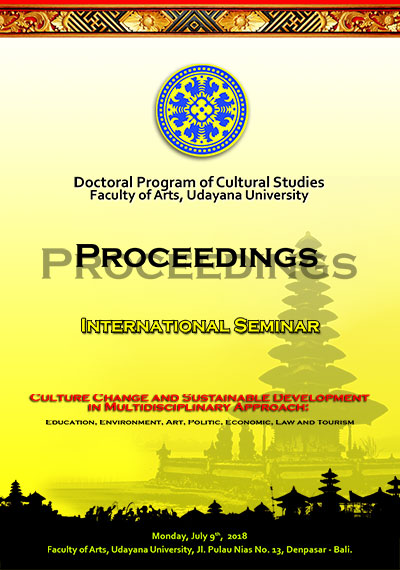THE TRANSFORMATION OF SPACE AND PRACTICE OF BALINESE WOMEN’S BEAUTY IN THE GLOBALIZATION ERA IN DENPASAR CITY
Abstract
Globalization becomes a marker of a new era that new “fever” has emerged. No one can resist or refuse this new “fever.” A truly new world or just a new engineering is not so important because the “new” diction becomes an ideology that globalization brings. This means that many socio-cultural structures in the societal life have changed from radical, fast, instant, or evaluative, slow and thoughtful condition. No exception for the body also experienced globalization transplantation. Women experience aesthetical changes through the construction process of space and practice of beauty. Similarly, men do not miss the style that is increasingly difficult to be distinguished between one place and another. The construction of Balinese women’s beauty in today’s era of globalization refers not only to the sociocultural aspects of Balinese society (local culture) but also to the market-oriented which is strongly influenced by the media. The simple and very private space and beauty practices now come with high technology and very publicly can meet the desire of Balinese women to obtain beauty in accordance with the ones presented in various media. There are three interesting points to be examined in this paper. Firstly is the changing space and practice of beauty. Formerly, the beauty-oriented practice of the royal family belonged to the tri-caste group, but it is now very capitalistic and full of imagery. Secondly, the beauty products are increasingly complex. In the beginning, the forms of women’s appearance or beauty products were recognized through fashion or the fashion in use and limited only to certain moments, but now Balinese women have enough courage to look expressive in everyday life. Thirdly is the Beauty Service Model. Beauty services, such as beauty salons, beauty clinics, fitness centers, and other body care establishments continue to improve, both in terms of number and variety of the services provided.
Downloads
References
______________ 2006b. Konstruksi dan Reproduksi Kebudayaan. Yogyakarta: Pustaka pelajar. Barker, Chris, 2005. Cultural Studies: Teori dan Praktik, terjemahan, Cultural Studies: Theory and Practice. Yogyakarta:. PT Bentang Pustaka.
Barnard, Malcolm, 1996. Fashion sebagai Komunikasi: Cara Mengomunikasikan Identitas Sosial, Seksual, Kelas dan Gender. Yogyakarta: Jalasutra.
Featherstone, Mike, 2001. Posmodernisme dan Budaya Konsumen (Misbah Zulfa Elisabeth Penerjemah). Yogyakarta: Pustaka Pelajar.
Foucault, Michel, 2000. Seks dan Kekuasaan (Sejarah Seksualitas). Bandung. PT. Gramedia Pustaka Utama.
Kusuma Djaya, Ashad, 2007. Natural Beauty Inner Beauty: Manajemen Diri Meraih Kecantikan Sejati dari Khazanah Tradisional. Yogyakarta: Kreasi Wacana.
Story, J., 2003. Teori Budaya dan Budaya Pop Memetakan Lanskap Konseptual Cultural Studies. Yogyakarta: CV Qalam.
Steger, M B., 2006. Globalisme Bangkitnya Ideologi Pasar. Huru Prasetia (Penerjemah). Yogyakarta: Lafad Pustaka.

This work is licensed under a Creative Commons Attribution-NonCommercial-ShareAlike 4.0 International License.





